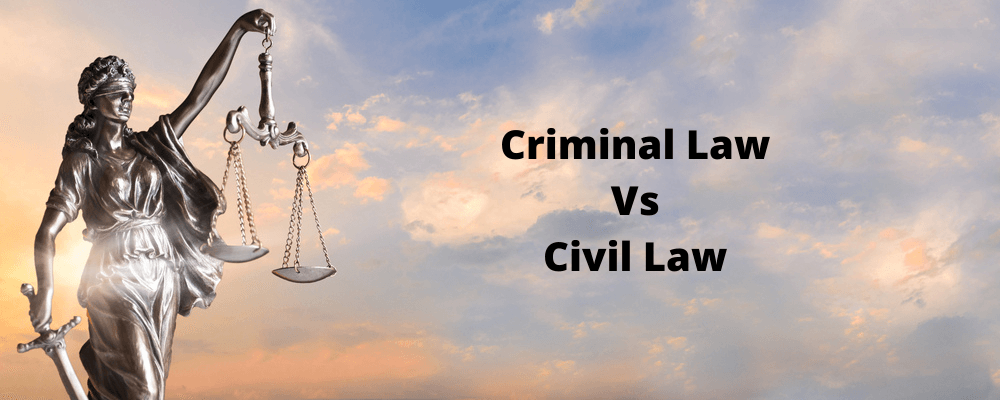Do you know what is the difference between criminal law and civil law? If you do, that’s great; if not, don’t worry. Many people get confused by UK criminal law and civil law.
Criminal law defines what activity is illegal and punishes the offender. And it prevents offenders from reoffending the same crime. In a criminal lawsuit, the conflict is generally between the government authority and a person or persons.
Civil law is to ensure the right of a civilian is met. In civil cases, the conflict is generally between two or more private parties. The trial process and punishment are also different from each other.
Read this blog to learn about the differences between criminal law and civil law.
Table of Contents
Difference Between Criminal Law and Civil Law

Criminal law and civil law are entirely different from one another. The most significant difference between the two law systems is the aim and punishment of the cases.
In civil law, the objective of civil rights lawyers is to put the person who had suffered back in their position before the injury or harm occurred. In other words, you can say that the purpose is to set right an unfair situation.
On the other hand, criminal law aims to punish offenders. Also, it is designed in a way to prevent them from re-offending. It also has a more general goal, which is building a stable and law-abiding society.
So, you can see that criminal and civil law are different from each other. So, we put together a table below to give knowledge about both laws.
| Criminal Law | Civil Law | |
| Definition | The law of crimes and their punishments. | The law of civil or private rights. |
| Parties | Government authority and a person or persons. | Two or more private citizens |
| Goal | To bring offenders in front of justice. | To compensate the injured party. |
| Punishment | May include probation, incarceration and fines. | Financial support. For example, paying a worker medical bills. |
| Conduct at issue | Serious. | Less severe than criminal law. |
| Burden of proof | Beyond a reasonable doubt. | Preponderance of evidence. |
| Example | Homicide, assault. | Custody dispute, breach of contract. |
Here is more comprehensive information about the difference between criminal and civil law. Read on to know more about the difference.
Definition of civil law and criminal law
Criminal laws define criminal activities and establish legal punishments for the people. It makes sure convicts get punished for their criminal or illegal activity. For instance, if a person commits a crime or is involved in criminal activities, they will be punished. Although, the criminal court system only conducts criminal law cases.
On the other hand, civil laws deal with the private rights of a person. They are applied when other persons or organisations violate a person’s rights. Civil laws are also applied if an individual has disputes with other individuals or organisations. Unlike criminal law cases, it is possible to handle civil cases outside the courtroom. For example, you can resolve a dispute settlement through a third-party mediator.
Examples of civil laws and criminal laws
There are numerous types of cases you may find in either branch of law. Some of them you may hear or face in your life. Also, being aware of what type of laws can help you understand what steps you should take. Here we put together a list of examples of criminal and civil laws to give you a better idea of the subjects.
| Civil law | Criminal law |
| Custody disputes | Homicide |
| Defamation | Assault |
| Breach of contract | Obstruction of justice |
| Bankruptcy | Conspiracy |
| Property damage | Possession of illegal substance |
Parties involved in the lawsuit
The parties involved in civil and criminal cases are different from others. In civil cases, the plaintiffs are generally the civilian, and they claim and file a lawsuit against the defendant. In contrast, the government and her majesty handle criminal prosecutions.
Anyone who is injured while working for an individual, corporation, or other business entity can sue civilly. In civil cases, an injured party sues to receive a court-ordered remedy from the defendant. For instance, the court order remedy can be money, property, or some performance.
The parties involved in a criminal case may be government authority and a person or persons.
Goal
Another substantial difference between civil law and criminal law is the purpose. The goal of a civil case is to compensate the plaintiff for injuries by the defendant. However, the goal of a criminal lawsuit is to punish the defendant according to criminal law.
Punishment

A judge sentences a defendant, a person who is found guilty by a jury in a criminal case. However, the judge must follow the sentencing guidelines established by current criminal law. But the judge has some discretion within those sentencing guidelines. For example, in a criminal case, legal penalties may include probation, incarceration and fines. Also, a criminal case can lead to serving time in jail.
On the other hand, a defendant has to pay financial support to compensate the plaintiff in a civil case. For example, compensation may be paid for medical bills or personal losses such as pain and suffering. Sometimes, a jury may award extra punitive damages to the offenders.
Conduct at issue
The rules or laws are very different from one another. Therefore, the conduct at issues is also different from others. The criminal laws of conduct at issue are more serious than civil laws. This is because these crimes are intended and cause severe damage to people.
For instance, a person intentionally killing another person is a criminal offence. In contrast, if a person fails to follow the rules and cause an accident, it is a civil offence.
Burden of proof

Another significant difference between civil and criminal laws is what it takes for a party to win a case. In both trials, the accuser must meet a burden of proof to get justice. Also, it is an essential obligation that they need to prove or back up the claims.
In criminal cases, the damages are more severe. This is why it also requires a higher bar to be met than civil cases when presenting proof. In the criminal lawsuit, the standard is that the accused are guilty of committing a crime “Beyond a reasonable doubt.”
The burden of proof is less critical in civil cases than in criminal cases. Also, it is usually based on the “Clear and convincing” or “Preponderance of evidence” standards. These different standards may seem a bit frustrating to those who are not familiar with them.
You’ve probably heard of criminal cases where the evidence makes defendants think they’re probably guilty, but they were just acquitted. In this case, the criminal defence attorneys worked to weaken the evidence and credibility of the witnesses to create reasonable suspicion among the jurors.
Mindset
In civil and criminal cases, how an attorney approaches a case can also vary greatly. Criminal laws are very complex. An attorney can quickly and efficiently resolve a civil lawsuit without requiring too much effort. When handling a criminal case, an attorney must closely consider proof, rules of evidence, litigation strategy, and philosophy of a claim.
One of the significant differences between these two laws is in the approach to negotiating a deal. In civil suits, you have much more flexibility in resolving the lawsuit. Unfortunately, studies have shown over 90% of civil cases are settled and never even make it to trial.
Statute of limitations
The amount of time a prosecutor or plaintiff has after an incident to press charges or bring a claim against a defendant is different in civil and criminal laws. These laws are intended to save defendants from unreasonable claims. Think of it this way, if someone accused you of a crime that occurred 20 years ago. Would you be able to provide evidence that proves you are not guilty?
Every state has their own set of guidelines for the statute of limitation. However, you should know that many serious crimes like murder, kidnapping or sexual assault may not have a statute of limitations.
Plea Bargains and Settlements

Most criminal and civil cases never go to trial. Therefore, the percentage of cases that goes to the sentencing stage is very few. In both cases, the parties who have a dispute with each other arrive at an agreement before it makes it to the court. Both parties think that the final outcome will either be very bad or very good for one party. Hence, the plea bargain for criminal lawsuits and settlement for civil cases.
In criminal prosecutions, the agreement is called a plea bargain. In a plea bargain, the defendant admits to their wrongdoing in return for a lower sentence. Sometimes the plea bargain occurs because the guilty verdict doesn’t think that they will win the case. Also, they feared that they would face a more severe sentence in the final result. Another form of a plea bargain is defendant testimony in other cases.
In civil trials, the agreement is called a settlement. In a civil case settlement, the defendant makes a payment offer to the plaintiff for their injuries. Both plea bargain and settlement occur because the defendant thinks that they would not win the case. Also, if the case reaches a final verdict, the punishment would be more severe. However, in a settlement, the defendant does not admit to any of their wrongdoing.
Related:
1. How to Become a Criminal Intelligence Analyst
2. How to Clear Criminal Record in the UK?
Ending Note
As you can see, when comparing criminal and civil law, there are several important distinctions. And these distinctions might impact a legal team’s or your approach when managing a lawsuit. However, if you love learning about the complexities of the legal system, there might be a role for you in the courtroom. There are plenty of job opportunities and lucrative salaries you could have.
For instance, you could become a Criminal Intelligence Analyst. The starting salary is £20,000 per year also you can earn up to £52,000. So, are you interested?
If you are, you can take a course from One Education on Criminal Intelligence Analyst. This course is delivered through an online learning platform. You can access this course and materials through any internet-connected smart device. Also, there are no formal deadlines or teaching schedules. So, you can study the course any time you want and at your own pace.
After successfully completing this online course from One Education, you will receive a
CPD certification from One Education.
FAQs
1 . What is the difference between criminal law and civil law (5 points) ?
1. Criminal law involves society’s offenses, civil law handles individual disputes.
2. Government prosecutes criminal cases, private parties initiate civil ones.
3. Criminal guilt requires proof beyond doubt, civil cases rely on evidence preponderance.
4. Criminal penalties: fines, imprisonment; civil remedies: compensation, injunctions.
5. Criminal cases can lead to jail, civil cases usually result in monetary or equitable relief.
2. What does civil law focus on?
Civil law focuses on resolving disputes between individuals or organizations concerning legal rights and responsibilities, typically involving issues such as contracts, property, family matters, and torts.
3. How is civil law different from criminal law?
Civil law resolves disputes between individuals, aiming for compensation, while criminal law punishes offenses against the state, focusing on maintaining social order through public prosecution and potential imprisonment or fines.
4. What is civil law examples?
Examples of civil law include cases involving contracts, property disputes, family matters like divorce or custody battles, and personal injury claims.
5. What are criminal laws?
Criminal laws define offenses against the state and carry penalties such as imprisonment or fines. They address acts deemed harmful to society, like theft or assault.
Recent posts
- The Impact Of Remote Work On Women In The Marketing Industry
- 5 Reasons Why You Should Pursue a Cybersecurity Career
- Differentiating Web Design and Web Development
- Top 10 Social Media Management Tools for Businesses in 2024
- Why is Child Development so Important in Early Years
- Line Management: How to be a Good Line Manager?
- How Long Should a Health Sector Career Take?
- The Importance of BSL in Everyday Life
- Why Corporate eLearning is Essential for Organisational Training
- Take your Business Expertise to the next level: Get your MBA







 July 09, 2021
July 09, 2021








